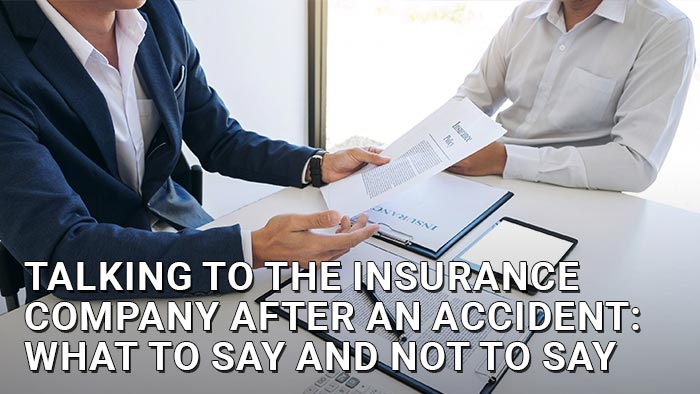
If you were injured in a car accident in New Jersey, you’ve likely exchanged insurance information with the other driver and also reported the crash to your own insurance carrier.
You can expect an insurance claims adjuster to call you afterward, whether from your own provider or from the at-fault party.
Note that your conversation with the insurance company could lead to mistakes that might cost you your compensation.
A car accident attorney can help you understand New Jersey car accident laws and ensure that your rights are protected.
What Should You (not) Say to the Insurance Company After a NJ Accident?
Adjusters work for the insurer; they are trained to spot weaknesses in claims to minimize payouts. Countless times, claimants have hurt their own cases by giving statements to adjusters that were later used against them.
When an insurance representative calls you about your car accident, remember these steps.
DO refer to your attorney.
It is wise to reach out to a personal injury lawyer even before you speak with an insurance company.
When the insurance adjuster calls, you may give only basic, limited answers, then refer the adjuster to your attorney for further discussion. Your lawyer should be experienced in how to best deal with auto insurers.
DO remain calm.
Stay professional while giving limited responses to the adjuster. Politely decline questions you believe you shouldn’t answer, and avoid making disparaging comments about anyone involved.
Maintaining a professional demeanor will establish you as a credible person and create a more favorable impression with the adjuster.
DO ask for their identity.
In case you need to refer to this conversation later on, ask the caller for their name, position, and contact information.
DO provide your very basic info.
If the adjuster asks, it’s okay to provide your name, address, contact information, and place of employment. But limit your answer to just those basics. You don’t need to give details about your home, family, personal life, job, income, or the like.
DON’T agree to recorded statements.
Adjusters will commonly say that they want to “tape” or record your conversation. You are absolutely not required to agree to this, and refusing to agree will not affect your injury claim. Even if they don’t phrase it as a request, you can calmly say you refuse to be recorded.
DON’T talk about fault.
One of the biggest mistakes in insurance communication is ‘admitting’ to your own negligence.
Even if you think you contributed to the accident, don’t say anything about the supposed fault.
There have been many cases where claimants blamed themselves without directly saying “It’s my fault.” Examples of statements that can be taken as an admission of fault and should be avoided are:
- “I think I [did something].”
- “That part was my mistake.”
- “I’m sorry” or “I apologize.”
At the same time, avoid blaming the other party during your conversation, as this could paint you as a biased or antagonistic person. To be safe, don’t talk about anyone’s fault at all. Let your attorney examine your accident and build your case for you.
DON’T downplay your injuries.
The claims adjuster will ask about your car accident injuries or the state of your health, but you don’t have to answer this. Instead, explain that you and your attorney will disclose your injury details in a demand letter.
While you’re on the phone, the insurer will look out for any indication that your injuries aren’t as serious you claim they are. Even saying “I’m fine” or “I feel okay” could be used to downplay your injury claim.
You’ll also want to avoid making conclusions about your own health even if you feel well. Some accident injuries are not noticeable immediately, such as traumatic brain injuries that only present symptoms later on. See a doctor for a thorough evaluation, and refuse to sign any medical releases with the claims adjuster.
Likewise, avoid making any self-diagnosis with the insurance company. Some claimants make statements like “I have whiplash” or “It gave me PTSD,” and if such statements later turn out to be medically unfounded, they could seriously damage the credibility of the claim.
DON’T accept an early offer.
A common tactic among insurers is to offer a quick settlement, telling you they want to “help you” put everything behind you. This is most likely a lowball offer meant to appeal to desperate claimants.
An early settlement may address your immediate medical bills, but it’s likely much less than the full compensation you are entitled to, which may include your longer-term medical costs, rehabilitation, and more.
Don’t agree to a settlement before you have talked to your lawyer. Your attorney will help you determine the real value of your claim and can negotiate on your behalf to get a favorable amount.
Contact a New Jersey Car Accident Attorney Today
To effectively deal with the insurance company, it is best to get the guidance and representation of an experienced attorney.
Talk to us at the Grossman Law Firm. We are highly trusted in New Jersey for our personal injury cases, having helped numerous individuals and families obtain their maximum compensation. Your consultation with us is free.
Call (732) 625-9494 or send us a message for a free consultation.
